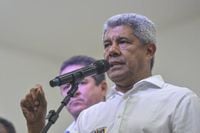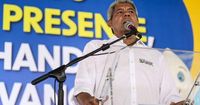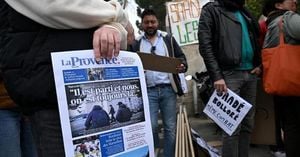The governor of Bahia, Jerônimo Rodrigues (PT), sparked controversy on Friday, May 2, 2025, when he suggested that voters of former President Jair Bolsonaro (PL) could all "go to the ditch." This statement was made during the inauguration of the Escola Estadual Nancy da Rocha Cardoso in América Dourada, located 427 kilometers from Salvador. Rodrigues criticized Bolsonaro's handling of the COVID-19 pandemic, stating, "We had a president who smiled at those who were in the pandemic, feeling short of breath. He will pay that bill, and whoever voted for him could also pay the bill!" He then escalated his rhetoric, saying, "Put a backhoe in there. You know what a backhoe is? It takes everything to the ditch."
The remarks drew immediate backlash, leading to a representation filed with the Supreme Federal Court (STF) by state deputy Diego Castro (PL). Castro argued that Rodrigues exceeded the limits of political discourse and misused his institutional position to attack political opponents. He stated, "Jerônimo Rodrigues has used his institutional position to conduct a permanent campaign against public figures on the right, especially former President Bolsonaro. This violates the principle of impartiality in public administration and dangerously approaches the practice of abuse of authority."
In the wake of the controversy, Deputy Nikolas Ferreira (PL-MG) accused the governor of promoting a "genocidal ideology." Ferreira remarked, "When I say that if they could, these people would kill us, people doubt it. And there are still those who believe we are dealing with just politicians with opposing views — no. They are driven by a genocidal ideology." The backlash continued to grow, drawing criticism from various political figures and the public alike.
On Monday, May 5, 2025, Jerônimo Rodrigues attempted to clarify his comments during a visit to the renovation works of the Teatro Castro Alves in Salvador. He stated that his words had been taken out of context and expressed his opposition to violence. "We criticize the way someone wishes death upon another. I am a religious person, from a family, and I will never treat any opponent in this manner. My statement was distorted," he said. Rodrigues also extended an apology to Bolsonaro's supporters, acknowledging that if the term "ditch" was pejorative or strong, he regretted it. "I had no intention of wishing death upon anyone. I have no problem in acknowledging when there are excesses in my words, driven by indignation," he added.
The situation escalated further when Deputy Ubiratan Sanderson (PL-RS) called for an investigation by the Attorney General's Office (PGR) into Rodrigues for incitement to crime. Sanderson's request emphasized that the governor's comments went beyond political critique and entered into violent rhetoric that threatens millions of Brazilian citizens who legitimately voted for Bolsonaro. He stated, "The declarations of the governor of Bahia exceed the realm of political criticism and enter into a violent, discriminatory, and threatening rhetoric directed at millions of Brazilian citizens who, in exercising their democratic right, opted for a certain candidate in the presidential elections."
In his impeachment request, Deputy Leandro de Jesus (PL-BA) echoed similar sentiments, arguing that Rodrigues' remarks constitute an "exhortation to violence and extermination of millions of Brazilian citizens." He noted that the metaphor of using a backhoe to remove political opponents evokes practices of genocide and mass violations of human rights, which are incompatible with the principles of a democratic state. The request cited Article 7 of the impeachment law (Law No. 1,079/1950), which defines the responsibility of governors for acts that violate constitutional and democratic order.
Leandro de Jesus further asserted that the governor's exhortation to violence against voters poses a direct threat to the exercise of political rights, violating the freedom of political expression and the right to vote guaranteed by the Federal Constitution. He emphasized that the episode creates an environment of intimidation and hostility towards a segment of the population based on their previous electoral choices.
During the same speech in which he suggested taking Bolsonaro's voters to the ditch, Rodrigues claimed that he does not discriminate against mayors and seeks to maintain good relations even with opponents. "The municipalities I visit, I go because I have an obligation to the democracy that elected the mayor and to the people who made their choice. Those who do not want democracy should leave Brazil and go to another place where there is no democracy. We must respect the will of the people," he stated.
This incident has raised significant concerns about political discourse in Brazil, especially given the historical context of political violence in the country. Critics argue that such language from a public official not only normalizes hatred but also encourages the worst forms of political violence, moral assassination, and even physical harm against those with differing opinions.
Despite the uproar, Rodrigues remains a prominent figure in Bahia, a state governed by the Workers' Party (PT) for 18 years. His administration's performance is seen as crucial for maintaining a wide margin of votes for President Lula, who had a significant advantage over Bolsonaro in the 2022 elections.
As the political fallout continues, the request for impeachment will be reviewed by the president of the Bahia Legislative Assembly, and the implications of Rodrigues' statements will likely resonate in the political landscape for some time to come. The situation underscores the delicate balance of political rhetoric in a deeply divided society, where words can have profound consequences.






